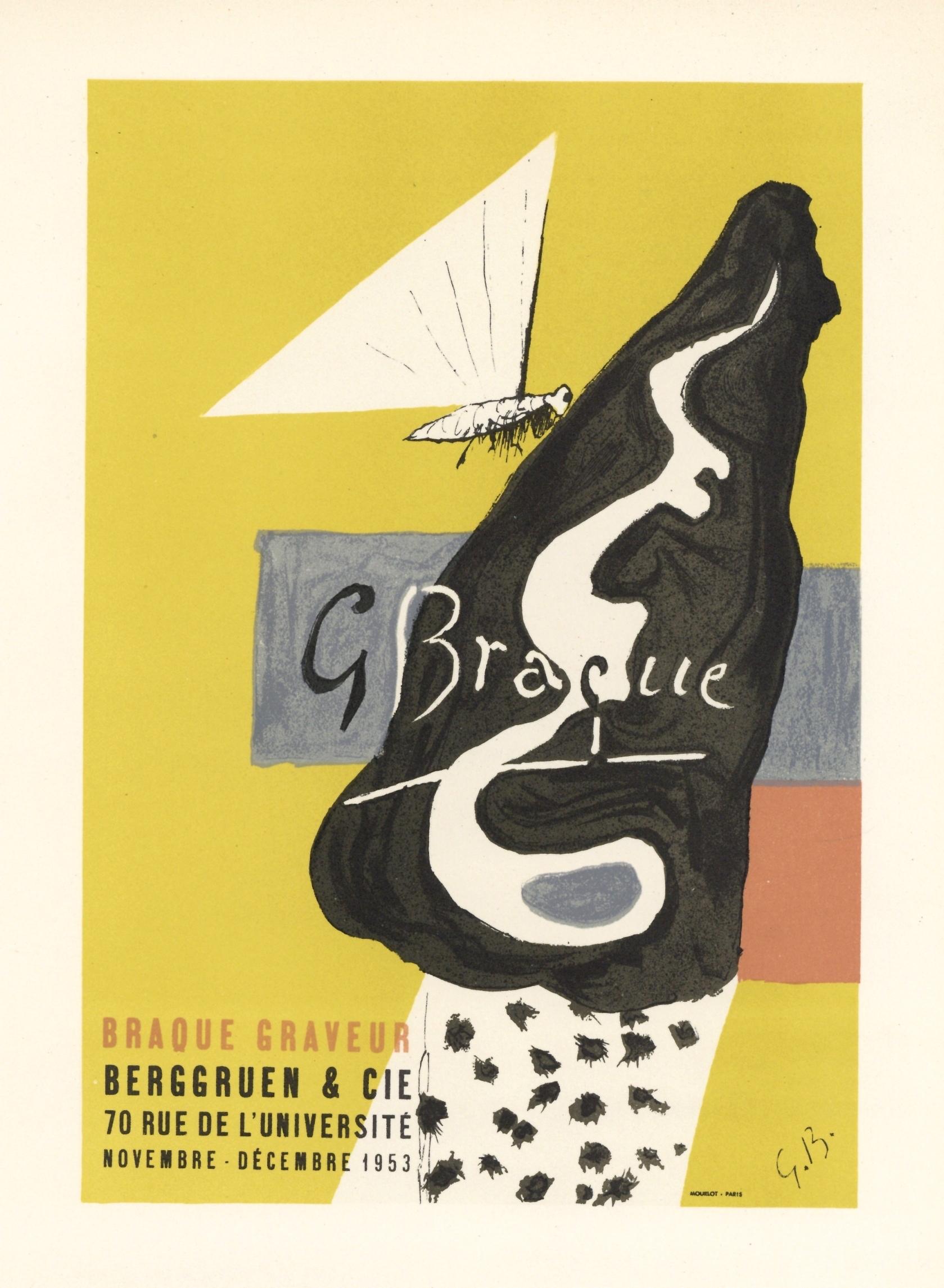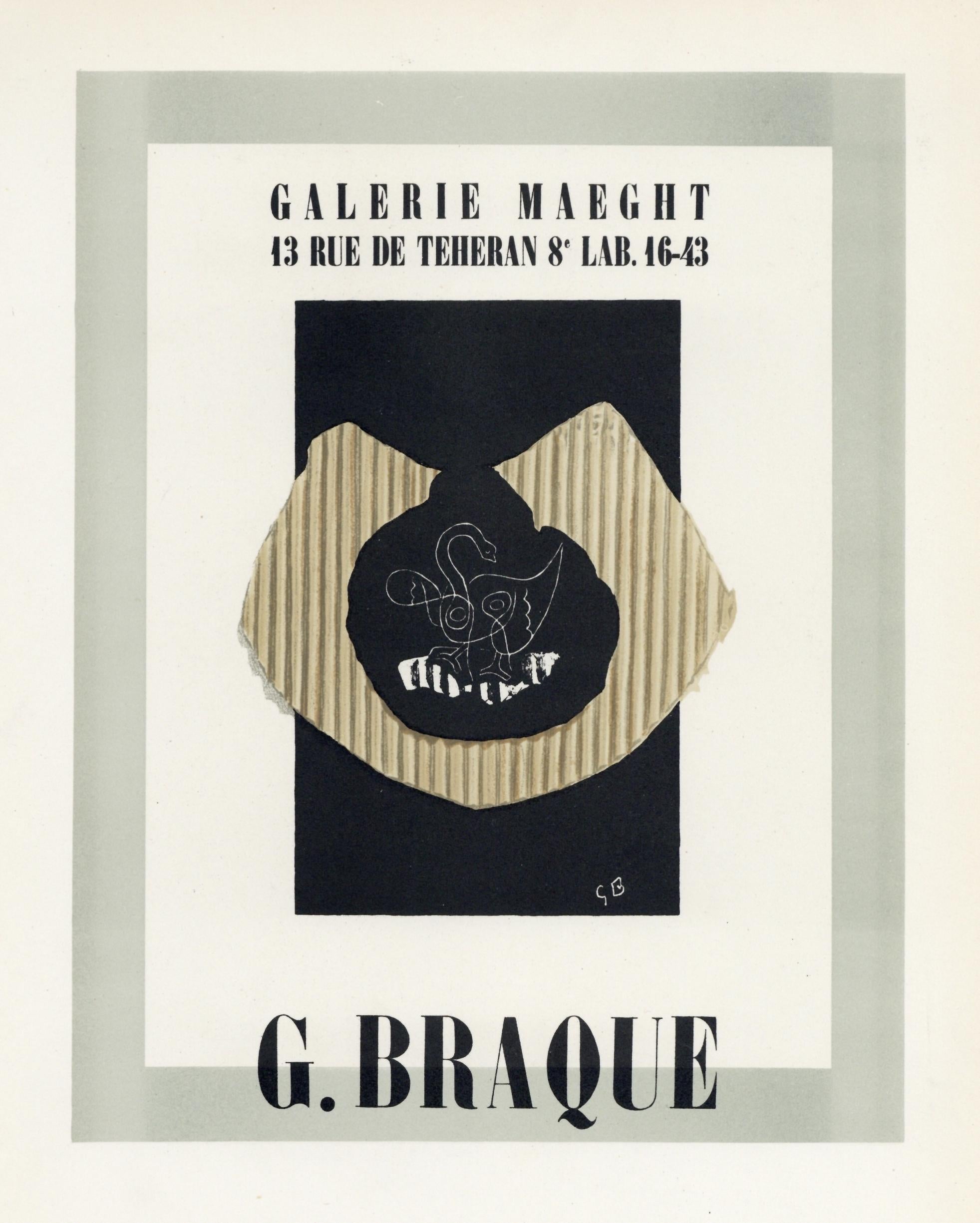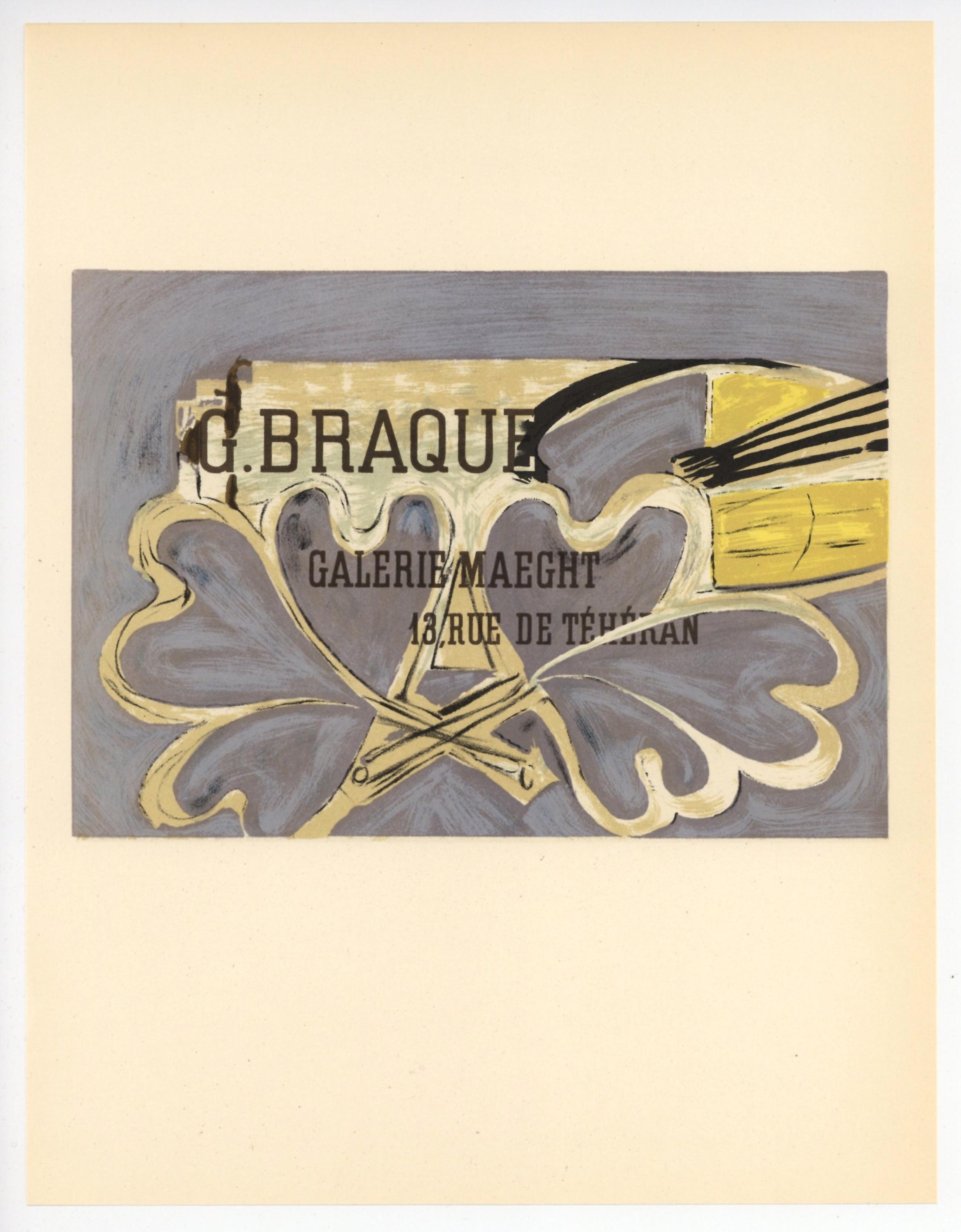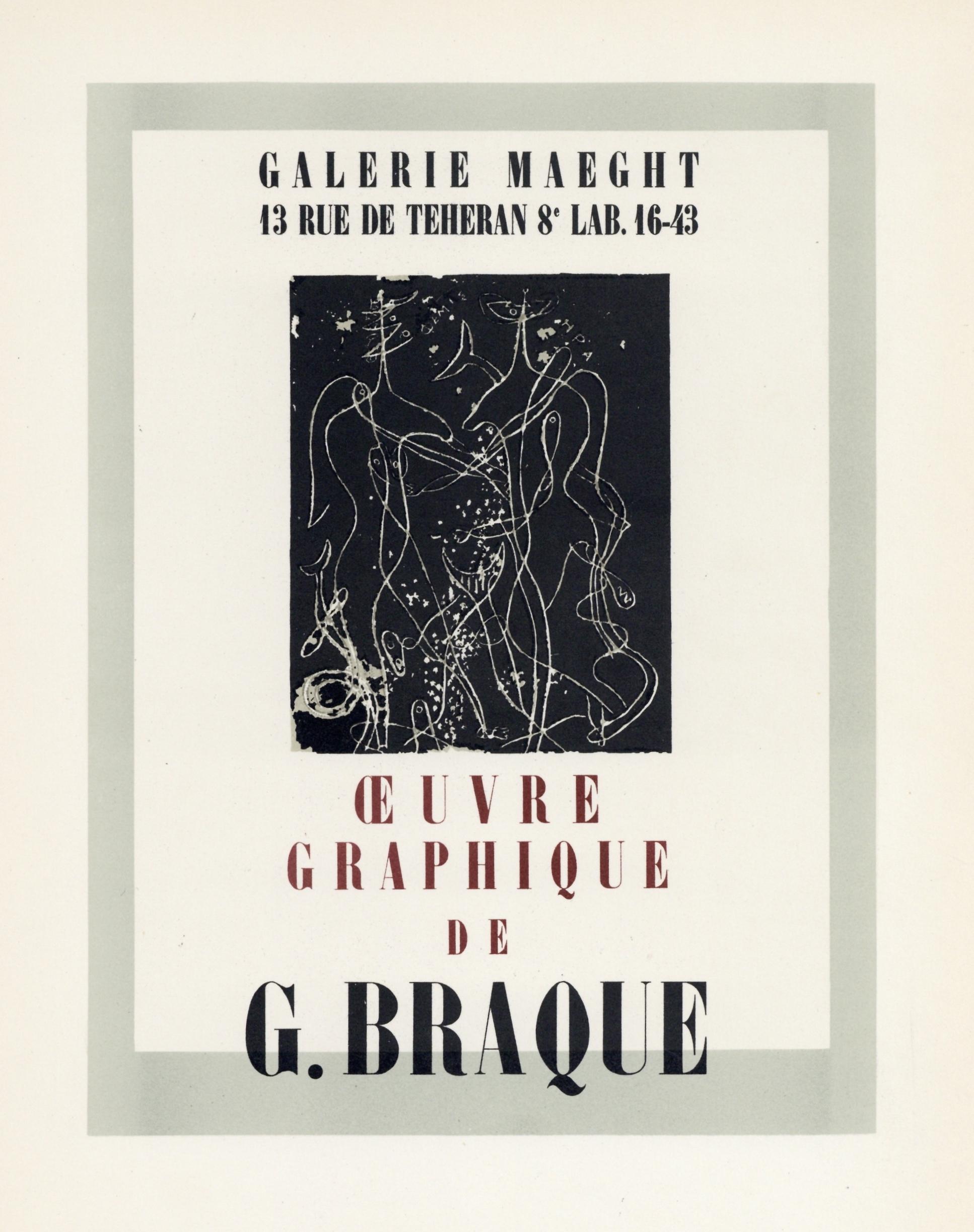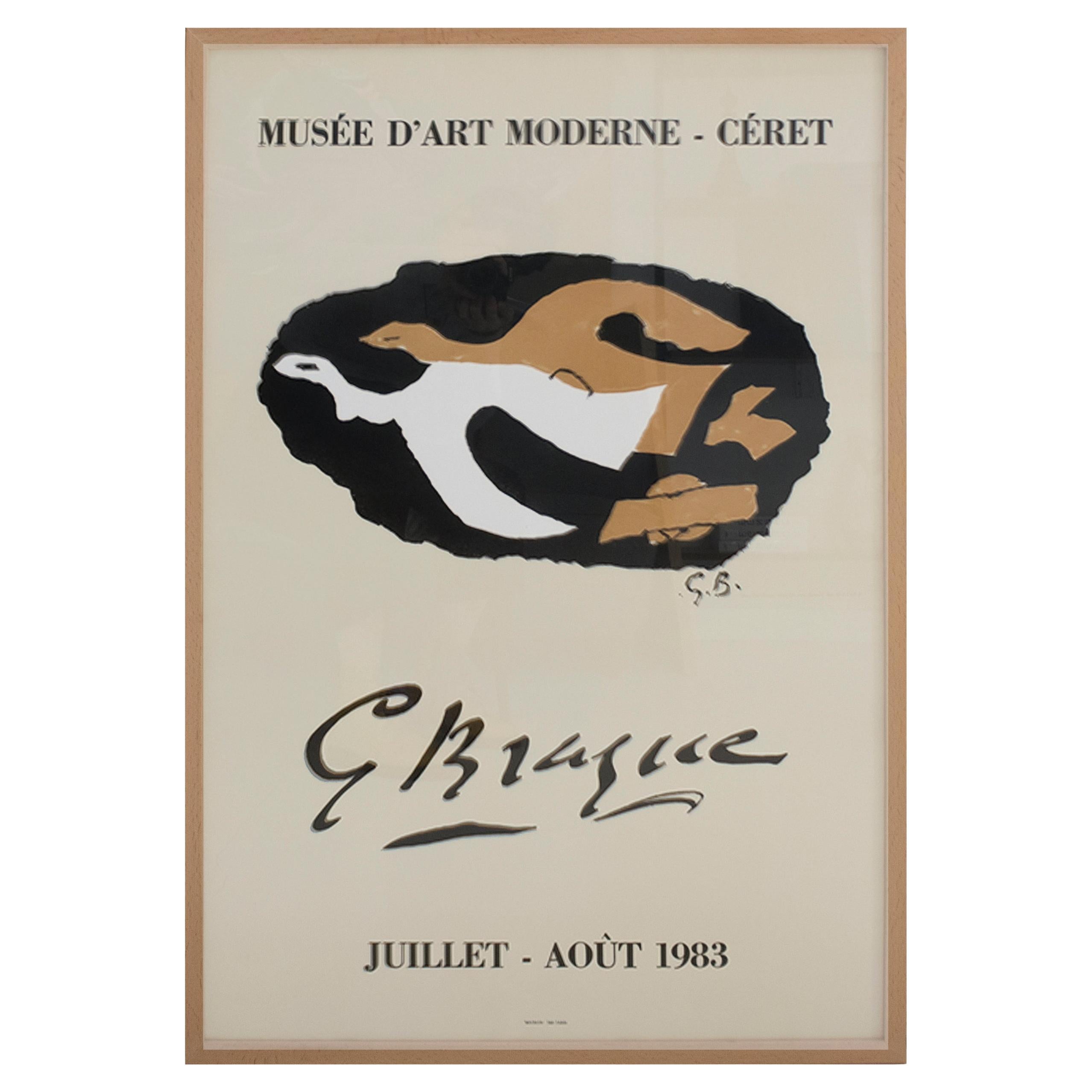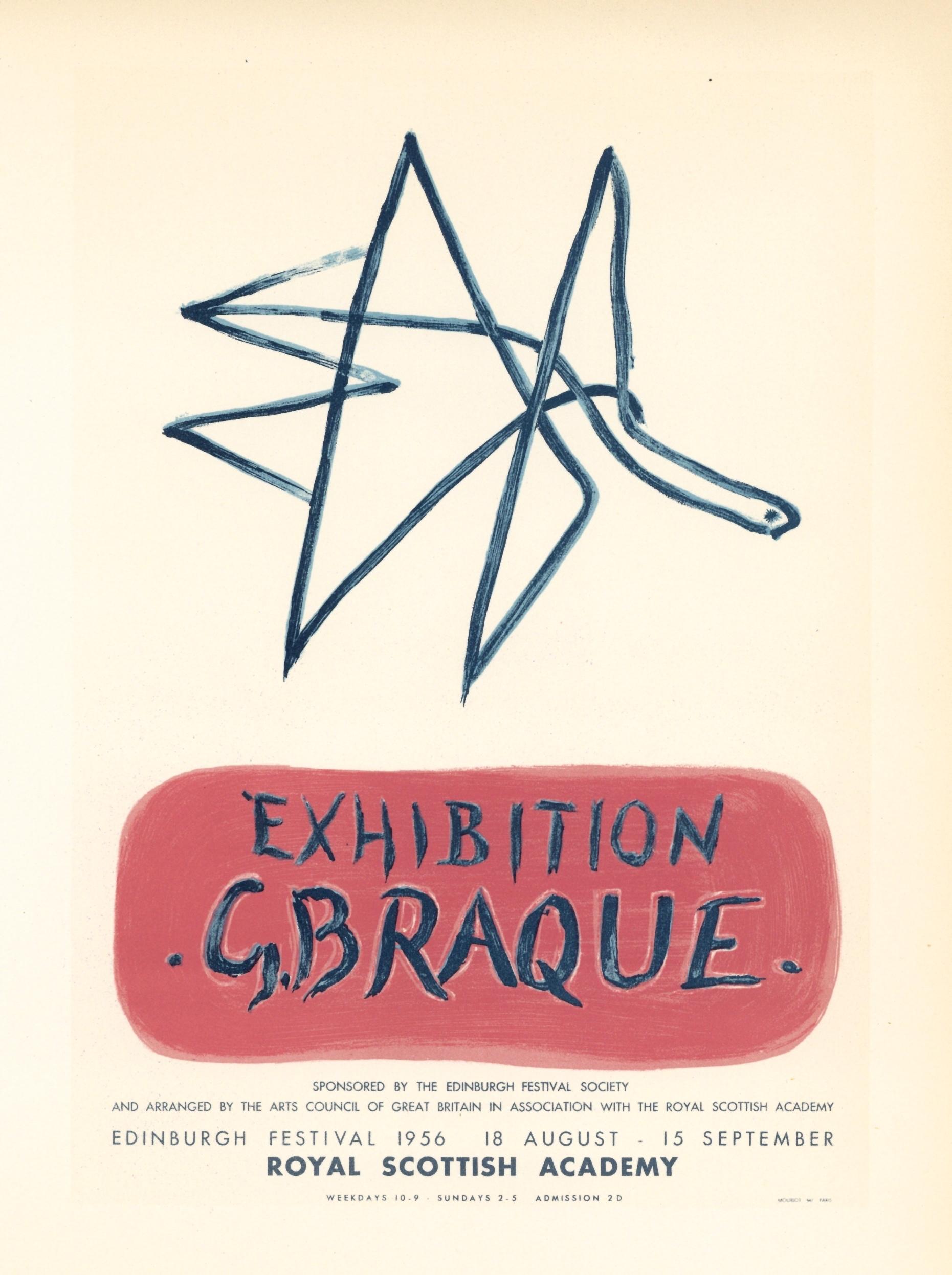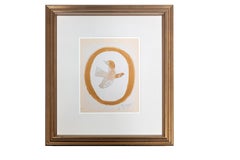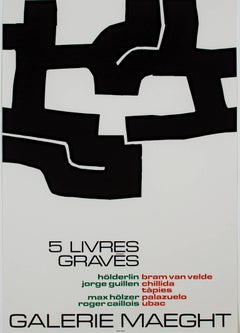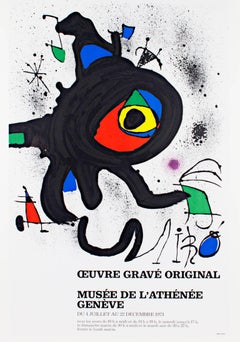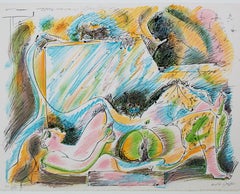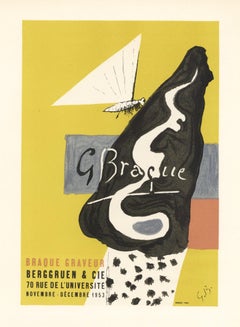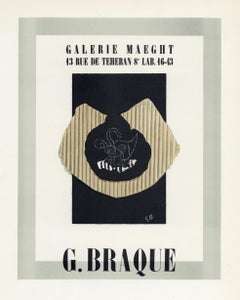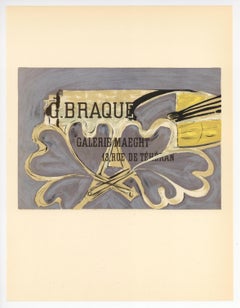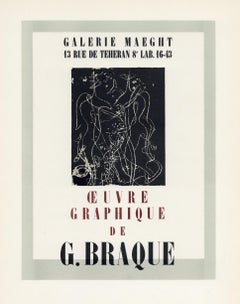Items Similar to "Braque Graveur, " Lithograph Poster signed in the stone
Want more images or videos?
Request additional images or videos from the seller
1 of 10
"Braque Graveur, " Lithograph Poster signed in the stone1953
1953
$6,500
£4,973.71
€5,692.46
CA$9,179.71
A$9,976.77
CHF 5,346.64
MX$121,135.72
NOK 67,123.79
SEK 62,247.11
DKK 42,515.70
About the Item
"Braque Graveur" is an original color lithograph poster. It depicts a moth or butterfly landed on a black abstract form. There are blue and reddish-brown abstract shapes as well, and it is all on a yellow background. The text in the bottom left corner details information for an exhibition.
26 1/2" x 18" art
38 3/4" x 30 1/4" frame
Georges Braque (13 May 1882 – 31 August 1963) was a major 20th-century French painter, collagist, draughtsman, printmaker and sculptor. His most important contributions to the history of art were in his alliance with Fauvism from 1906, and the role he played in the development of Cubism. Braque’s work between 1908 and 1912 is closely associated with that of his colleague Pablo Picasso.
Braque's earliest works were impressionistic, but after seeing the work exhibited by the artistic group known as the "Fauves" (Beasts) in 1905, he adopted a Fauvist style. The Fauves, a group that included Henri Matisse and André Derain among others, used brilliant colors to represent emotional response. Braque worked most closely with the artists Raoul Dufy and Othon Friesz to develop a somewhat more subdued Fauvist style.
In May 1907, he successfully exhibited works of the Fauve style in the Salon des Indépendants. The same year, Braque's style began a slow evolution as he became influenced by Paul Cézanne who had died in 1906 and whose works were exhibited in Paris for the first time in a large-scale, museum-like retrospective in September 1907. The 1907 Cézanne retrospective at the Salon d'Automne greatly affected the avant-gardeartists of Paris, resulting in the advent of Cubism.
Braque's paintings of 1908–1912 reflected his new interest in geometry and simultaneous perspective. He conducted an intense study of the effects of light and perspective and the technical means that painters use to represent these effects, seeming to question the most standard of artistic conventions. In his village scenes, for example, Braque frequently reduced an architectural structure to a geometric form approximating a cube, yet rendered its shading so that it looked both flat and three-dimensional by fragmenting the image. He showed this in the painting Houses at l'Estaque
Beginning in 1909, Braque began to work closely with Pablo Picasso who had been developing a similar proto-Cubist style of painting. At the time, Pablo Picasso was influenced by Gauguin, Cézanne, African masks and Iberian sculpturewhile Braque was interested mainly in developing Cézanne's ideas of multiple perspectives. “Picasso celebrates animation, while Braque celebrates contemplation. Later, these artists experimented with collage and papier colle.
Braque believed that an artist experienced beauty "… in terms of volume, of line, of mass, of weight, and through that beauty [he] interpret[s] [his] subjective impression...” He described "objects shattered into fragments… [as] a way of getting closest to the object…Fragmentation helped me to establish space and movement in space”. He adopted a monochromatic and neutral color palette in the belief that such a palette would emphasize the subject matter.
- Creation Year:1953
- Dimensions:Height: 38.75 in (98.43 cm)Width: 30.25 in (76.84 cm)
- Medium:
- Movement & Style:Synthetic Cubist
- After:Georges Braque (1882 - 1963, French)
- Period:
- Condition:
- Gallery Location:Milwaukee, WI
- Reference Number:Seller: 10610g1stDibs: LU60532043233
About the Seller
4.9
Gold Seller
Premium sellers maintaining a 4.3+ rating and 24-hour response times
Established in 1966
1stDibs seller since 2017
453 sales on 1stDibs
Typical response time: 1 hour
- ShippingRetrieving quote...Shipping from: Milwaukee, WI
- Return Policy
More From This Seller
View All"L'oiseau de sables (Bird of the Sands)" contemporary animal bright signed
By Georges Braque
Located in Milwaukee, WI
"L'oiseau de sables" ("Bird of the Sands") is an original signed lithograph by Georges Braque executed in 1962. It is 37 of an edition of 125. The work is one of five lithographs cre...
Category
1960s Fauvist Animal Prints
Materials
Printer's Ink, Lithograph
"Galerie Maeght-5 Livres Graves, " Original Lithograph Poster by Eduardo Chillida
By Eduardo Chillida
Located in Milwaukee, WI
"Galerie Maeght - 5 Livres Graves" is an original lithograph poster by Eduardo Chillida. The poster features one of Chillida's signature abstract designs as well as some information about an exhibition put together by Galerie Maeght. The poster is in black, white, red, and green.
25" x 16" art
33 1/8" x 24 3/8" frame
EDUARDO CHILLIDA was born the 10th of January of 1924 in San Sebastian (Spain). His first exhibition was in Paris in 1950. In this year he marries Pilar Belzunce. He has received almost all the existing prices throughout his life: from the Biennial of Venice to the Kandinsky, from the Wilhem Lehmbruck to Prince de Asturias, from the German Kaiserring to the Imperial Price in Japan...
Category
1970s Abstract Abstract Prints
Materials
Lithograph
"Musee De L'Athenee Ed. of 1000, " Original Color Lithograph Poster by Joan Miro
By Joan Miró
Located in Milwaukee, WI
"Musee de L'Athenee" is an original color lithograph poster by Joan Miro. It is from an edition of 1000. It showcases Miro's surreal biomorphic marks and is an advertising poster for...
Category
1960s Surrealist Abstract Prints
Materials
Lithograph
"La Naissance D'Eve, " Surreal Lithograph from "Je Reve" signed by Andre Masson
By André Masson
Located in Milwaukee, WI
"La Naissance D'Eve" is an original color lithograph from the "Je Reve (I Dream)" portfolio by Andre Masson. The artist signed the piece lower right in pencil and wrote the edition n...
Category
1970s Surrealist Figurative Prints
Materials
Lithograph
"Sixieme Biennale de Peinture, " Vintage Lithographic Poster
By Pablo Picasso
Located in Milwaukee, WI
"Sixieme Biennale de Peinture" is an vintage Picasso exhibition poster printed in 1966 by Mourlot. It depicts a Picasso painting from 1965 and advertises a Biennial exhibition of pai...
Category
1960s Cubist Figurative Prints
Materials
Lithograph
"Bonal, " Original Lithograph Poster by Adolphe Mouron Cassandre
By Adolphe Mouron Cassandre
Located in Milwaukee, WI
"Bonal" is an original lithograph poster by Adolphe Mouron Cassandre. It features an abstracted figure drinking Bonal Gentiane Quina, a cocktail or aperitif, which, consumed before a...
Category
1930s Art Deco Figurative Prints
Materials
Lithograph
You May Also Like
"Braque Graveur" lithograph poster
By (after) Georges Braque
Located in Henderson, NV
Medium: lithograph (after the original lithograph poster "Braque Graveur" for the Berggruen Gallery). During the late 1940's and throughout the 1950's, Georges Braque created a serie...
Category
1950s Prints and Multiples
Materials
Lithograph
"G. Braque" lithograph poster
By (after) Georges Braque
Located in Henderson, NV
Medium: lithograph (after the original lithograph poster for the Maeght Gallery). During the late 1940's and throughout the 1950's, Georges Braque created a series of posters at the ...
Category
1950s Prints and Multiples
Materials
Lithograph
"Gallerie Maeght" lithograph poster
By (after) Georges Braque
Located in Henderson, NV
Medium: lithograph (after the original lithograph poster for the Maeght Gallery). During the late 1940's and throughout the 1950's, Georges Braque created a series of posters at the ...
Category
1950s Prints and Multiples
Materials
Lithograph
"Oeurve Graphique" lithograph poster
By (after) Georges Braque
Located in Henderson, NV
Medium: lithograph (after the original lithograph poster for the Maeght Gallery). During the late 1940's and throughout the 1950's, Georges Braque created a series of posters at the ...
Category
1950s Prints and Multiples
Materials
Lithograph
Lithograph Poster by Georges Braque, Musée D'art Moderne- Céret, France, 1983
By (after) Georges Braque
Located in Madrid, ES
Original Lithograph Poster by Georges Braque, printed by Atelier Mourlot, created for the 1983 Braque exhibition at Musée d’Art Moderne in Céret, France.
Georges Braque (1882-1963)...
Category
Vintage 1980s French Posters
Materials
Wood, Paper
"G. Braque Exhibition" lithograph poster
By (after) Georges Braque
Located in Henderson, NV
Medium: lithograph (after the original lithograph poster for the Maeght Gallery). During the late 1940's and throughout the 1950's, Georges Braque created a series of posters at the ...
Category
1950s Prints and Multiples
Materials
Lithograph
More Ways To Browse
Stone Lithograph Poster
Jasper Johns Whitney Flags
Jean Allemand
Jennifer Bartlett 24 Hours
Joan Miro 1958
Joan Miro Ceramiques
Joan Miro Constellations
Joan Miro Hand Signed Limited Edition Poster
Joan Miro Homenatge
Joan Miro Signed Numbered
Joan Miro World Cup Lithograph
Joan Mitchell Tree
Joe Chia
John S De Martelly
Juilliard Poster
Kandinsky Verve
Karel Appel Poster
Karl Korab
